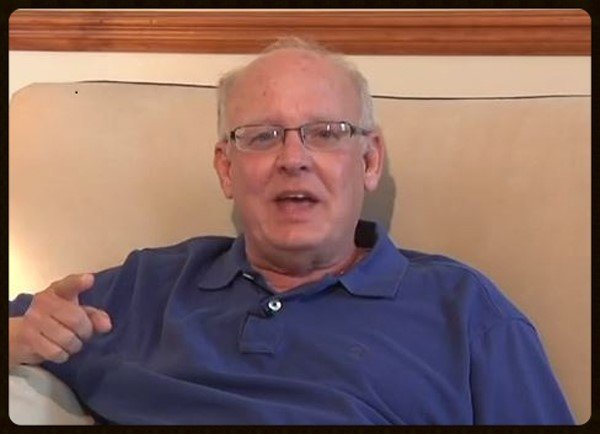NYAPRS Note: The following tribute to Steve Harrington, one of the nation’s foremost pioneers and champions for peer services comes from our friend and partner at the NYS Academy of Peer Services, Rita Cronise.
Remembering Steve
Posted by Rita Cronise, Academy of Peer Services – Virtual Community CoordinatorDecember 14, 2021
December 14, 2021
I received word today that Steve Harrington passed away on November 29, 2021. Steve was the founder of the National Association of Peer Specialists, and he was a prolific writer, humorist, thought leader, and a personal friend. To remember Steve, I thought I would begin with a short history of N.A.P.S.
A Brief History of iNAPS now dba National Association of Peer Supporters (N.A.P.S.)
(The following history of iNAPS, now known as N.A.P.S. is adapted from a conversation with founder, Steve Harrington, a presentation given by Lori Ashcraft and Andy Bernstein in 2016 at the 10th Annual Peer Specialist Conference in Philadelphia, a conversation with founding members Diann Schutter and Mike Roaleen, and information about the organization that was current at the time the history was written in 2020, provided by past director, Martha Barbone.)
“So why are you helping me, anyway?” The patient was someone who had seemingly lost all hope of ever getting better, ever living a life that mattered, or ever even feeling like there was any point to living at all.
“I’m a peer support specialist,” Steve replied gently, as he sat next to the patient.
The patient squinted at Steve’s face, an uncommon mix of respect and concern. With a puzzled expression the patient asked, “What’s that?”
Steve Harrington was a peer support specialist (PSS) at Touchstone, an agency in Grand Rapids, Michigan and because the job and title was something new to the agency had answered that question countless times for people receiving services. He was purposely not getting much direction from his supervisor, Ted, who knew Steve and the other PSS’s needed to use their personal experiences to build trusting relationships first before they could be effective in offering peer to peer support. Ted knew that each person is different, living with different circumstances, and Steve and the others would find their own unique way to connect. So instead of giving Steve direction on how to perform the role, Ted said, “use what you’ve learned about recovery in your own life, listen carefully, and do what comes naturally to you with each person, and then tell me what you did.”
The supervisor’s confidence in Steve and the others paid off. After two months, Steve and the others reported back to Ted, and their job descriptions were created. Each job description was tailored to include ways each of them had used their personal experiences and unique personal attributes, like a good sense of humor, to connect with and build relationships with people who, it seemed, nobody else could reach. Steve and five other PSS’s at Touchstone went through a similar process of creating their own unique job description.
Steve met regularly with other PSS’s at Touchstone and various agencies in Grand Rapids, Michigan to compare what they were doing and to learn how they could do their jobs better. The support they received from each other was not only important to doing their jobs well but to staying well themselves.
As he learned more about peer support services, Steve realized that he and his colleagues were not alone. There were other peers being hired in other parts of the country. They wondered what those other peers were experiencing; what problems they were facing and what solutions they were coming up with. This curiosity prompted Steve to take a trip to various places in different states visiting programs that hired peers. He soon became convinced of the need for a national association where peers could learn from each other and belong to something beyond their immediate jobs. This, he reasoned, would reduce the feeling of isolation and separation.
In 2004, Steve and founding members Mike Roaleen, Diann Schutter, Karen Murphy, Joel Penney, and Lynette Johnson-Bilski, Sue Clossen met regularly at the Unlimited Alternatives Drop-in Center to form the National Association of Peer Specialists (NAPS). Artist Susan Meekoff joined shortly after they got started.
To help reduce the sense of isolation and to share helpful information, Steve began to send out newsletters. The group gathered at Steve’s house for mailing parties. And through this simple newsletter outreach, he invited people to become members. He knew that peer specialists could not afford a lot, so he charged a low fee for an annual membership just to help cover printing and mailing costs. Steve spoke regularly with peer specialists across the country and shared what he was learning along the way. He used humor in his presentations and became a popular public speaker on the subject of peer support.
In 2006, the first National Conference was held in Denver. Andy Bernstein, a clinical psychologist who through the years became one of the most faithful allies joined at that time and has stayed active in the organization through the years. The National Conference has been held in different locations around the country ever since. (Read More)
Steve and I worked together to develop theNational Practice Guidelines for Peer Supporters, issued by the association in 2013 (and recently revised to include guidance for supervisors in 2019). We also developed a SAMHSA-funded collaborative learning program calledNext Stepsas part of the Recovery to Practice initiative. Through our work together, we developed a strong friendship that has lasted through the years since 2015 when a life altering stroke ended his career as executive director of iNAPS. I will miss his corny jokes, his love for gardening and nature, feeding peanut butter to the flying squirrels from his back deck, spotting otters playing in the lake, and his impressive knowledge of birds and wildlife, which he used to watch from his home on a lake in Michigan.
Farewell my friend. I will miss you.
